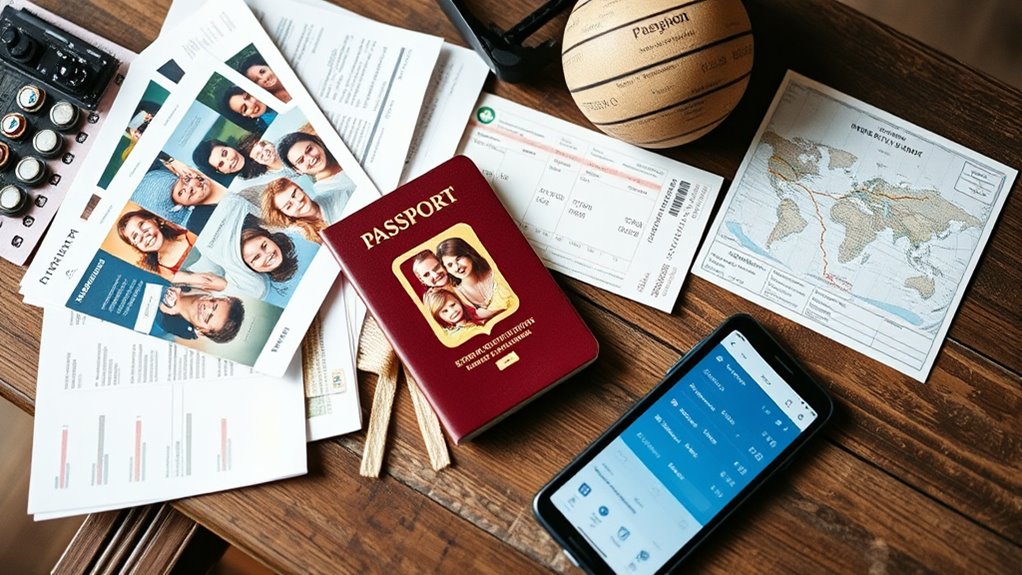To organize your family’s travel documents, gather all passports, visas, insurance info, and essential IDs, then create a centralized folder—digitally or physically—label everything clearly. Verify each document’s validity, ensuring passports have at least six months before expiration. Store copies of important contacts, reservations, and emergency info securely. Staying on top of local entry requirements and health protocols is vital. Keep essentials organized now, and you’ll discover how to streamline your entire trip preparation efficiently.
Key Takeaways
- Consolidate all travel documents into a secure digital folder with clearly labeled subfolders for passports, visas, itineraries, and confirmations.
- Verify that all family members’ IDs, passports, and visas are valid, up-to-date, and meet entry requirements.
- Scan physical documents and store encrypted copies on reputable cloud services for easy access and backup.
- Compile emergency contacts, including family, local embassies, and healthcare providers, in a dedicated, easily accessible file.
- Keep printed copies of essential documents as a backup, stored securely alongside digital files for quick retrieval during travel.
Gathering Necessary Travel Permits and IDs
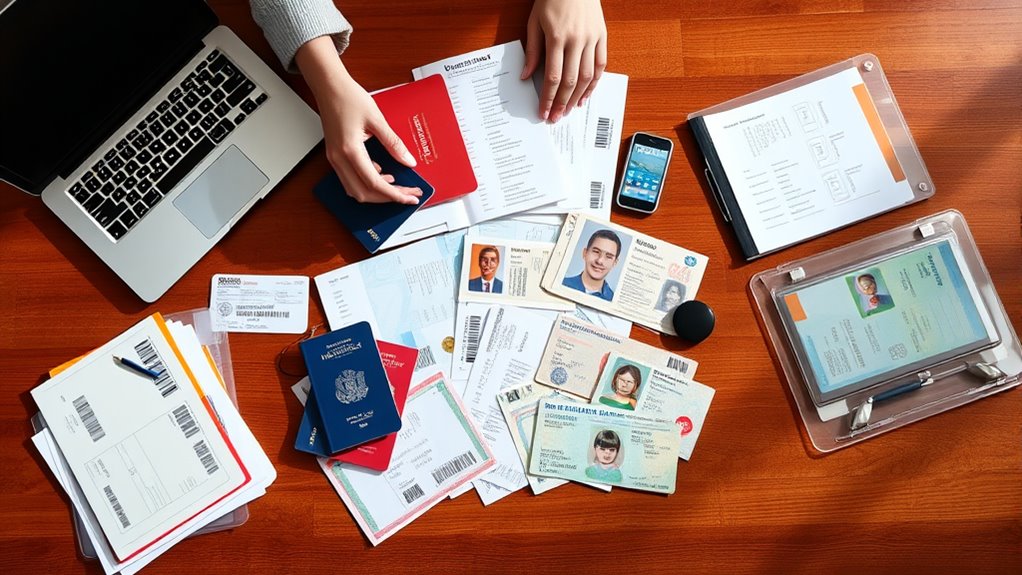
Before you start packing your bags, it’s essential to gather all the necessary travel permits and IDs. Check the travel document formats required for your destination, whether digital or paper copies. Make sure each family member has valid IDs, passports, or visas, and verify their expiration dates. Organize these documents so they’re easy to access during travel. Consider family document sharing options, like shared cloud folders, to keep everyone’s permits in one place. This helps prevent last-minute surprises or missing paperwork at checkpoints. Double-check that you have all essential permits, especially if traveling internationally, to avoid delays. Having everything organized and accessible ensures a smooth start to your trip and reduces stress during security checks. Proper document management can also help you comply with travel regulations and avoid penalties or entry issues.
Creating a Centralized Document Folder or Digital Backup

Creating a centralized folder or digital backup makes your travel documents organized and easily accessible. You can choose from various digital storage options and keep everything in one secure location. Using strong backup strategies guarantees your important files stay protected, even if your device is lost or damaged. Transparency in affiliate relationships can also be maintained by including relevant documentation within your storage system.
Digital Storage Options
Have you considered consolidating all your travel documents into a single digital folder or backup? Using cloud storage makes this easy, providing access from any device and guaranteeing your files are organized. To keep your sensitive information safe, enable file encryption before uploading. This adds an extra layer of security, protecting your documents from unauthorized access. Choose a reputable cloud service that offers strong encryption protocols and reliable backup options. Regularly update and verify your stored files to ensure nothing is missing or outdated. By creating a centralized digital storage solution, you streamline your document management, reduce the risk of losing important papers, and ensure quick access during your trip. This approach keeps your travel plans efficient and secure. Incorporating digital file organization best practices can further enhance your trip preparations.
Organizing Essential Files
Consolidating your travel documents into a single digital folder or backup makes managing your files more straightforward. This central location guarantees you have quick access to essential files like passports, visas, travel itineraries, and hotel confirmations. Include copies of your packing essentials lists and travel accessories, so you’re prepared for any situation. Organize your files with clear labels or folders categorized by family member or trip segment. Digital backups protect against loss or theft, giving you peace of mind. Keep the folder updated with recent documents and important contacts. Having everything in one spot simplifies packing and reduces last-minute stress. By maintaining an organized, centralized document system, you guarantee smoother travel and easier access to crucial information throughout your trip. Regularly reviewing and updating your travel documentation ensures you won’t forget any vital paperwork before departure.
Secure Backup Strategies
Are you making sure your travel documents are safely backed up? Creating a centralized document folder or digital backup is essential. Start by scanning physical documents to guarantee physical document preservation in case of loss or theft. Store these digital copies securely on a cloud service with shared family access, so everyone can retrieve what they need quickly. Use strong, unique passwords and enable two-factor authentication for added security. Consider organizing files into clearly labeled folders, such as passports, visas, and itineraries, to streamline access. A reliable backup system minimizes stress and keeps important documents safe, whether you’re at the airport or abroad. Regularly update your backup to include any new or revised documents, ensuring your family’s travel plans stay protected and accessible. Additionally, reviewing your privacy policies can help you understand how your document data is protected during storage and transfer.
Ensuring Validity and Renewals of Passports and Visas
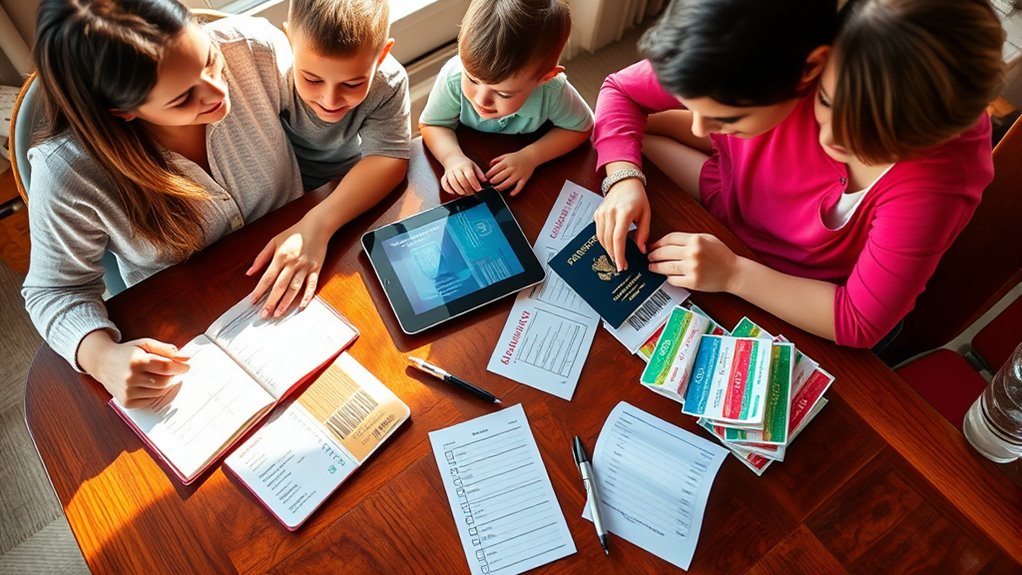
Make sure to check your passport and visa expiry dates regularly so you don’t run into last-minute issues. Planning renewals early gives you plenty of time to complete the process without stress. Staying proactive keeps your travel documents valid and ready whenever you need them.
Check Expiry Dates Regularly
Since passports and visas have expiration dates that can change without notice, it’s essential to check their validity regularly. Set expiry reminders ahead of time so you can handle passport renewal before travel plans. Regular checks prevent last-minute issues and guarantee all documents are valid for your trip. Keep a close eye on expiry dates, especially for visas that might need renewal or re-application. Use a tracking system to stay organized. Here’s a quick reminder table:
| Document | Expiry Date | Reminder Set? |
|---|---|---|
| Passport | YYYY-MM-DD | Yes/No |
| Visa | YYYY-MM-DD | Yes/No |
| Travel insurance | YYYY-MM-DD | Yes/No |
| Flight tickets | YYYY-MM-DD | Yes/No |
| Hotel reservations | YYYY-MM-DD | Yes/No |
Staying proactive with expiry reminders guarantees smooth travel without last-minute surprises. Regularly reviewing the validity of travel documents helps ensure all paperwork remains current and compliant with entry requirements.
Plan Visa Renewals Early
Planning your visa renewals early guarantees your travel documents stay valid and avoids last-minute complications. Start by checking the expiration dates on passports and visas well in advance of your trip. Gather recent passport photos now, so you’re prepared if renewal becomes necessary. Review your travel itineraries to identify when visas need to be valid for entry and stay duration. If your visas are nearing expiration, submit renewal applications early to prevent delays. Keep copies of all relevant documents, including passport photos and previous visas, organized in your travel folder. Renewing visas ahead of time ensures you won’t face issues at border crossings or need to reschedule your plans. Proactive planning minimizes stress and helps keep your family’s travel plans on track.
Preparing Travel Insurance and Medical Records
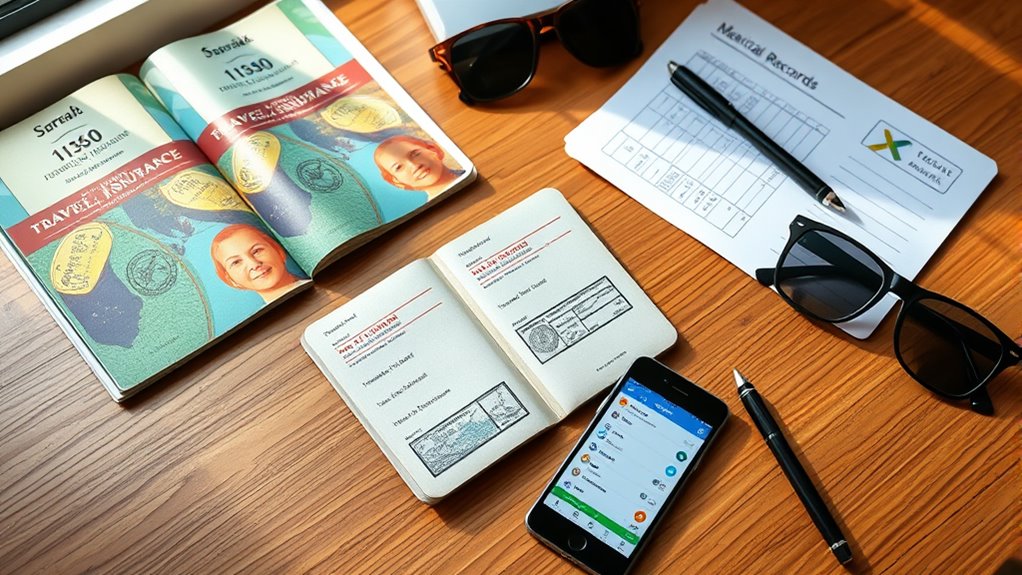
Ensuring you have up-to-date travel insurance and medical records is essential before your trip. Start by reviewing your travel health tips to make sure your insurance covers all family members abroad, especially if you’re visiting countries with limited healthcare options. Explore international coverage options to find plans that include emergency medical assistance, hospital stays, and repatriation. Keep digital and physical copies of medical records, including prescriptions, allergies, and recent treatments, easily accessible. Confirm that your insurance details are current and understand the claims process. Additionally, verify the self-watering plant pots to ensure your plants remain healthy during your absence. This preparation helps you avoid surprises and guarantees prompt care if needed. Taking these steps guarantees peace of mind, so you can focus on enjoying your family adventure without health-related worries.
Organizing Emergency Contact Information and Important Addresses
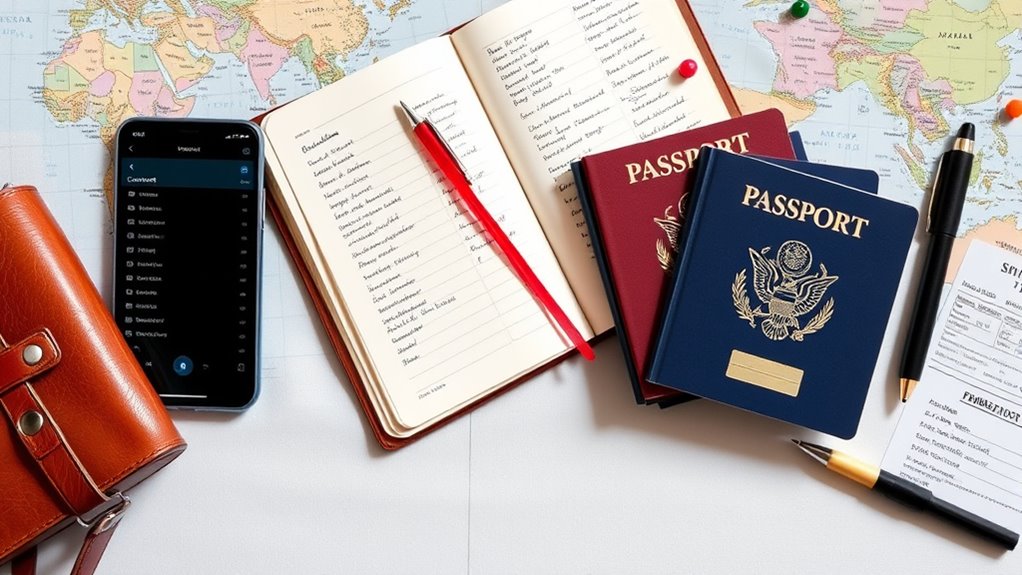
Organizing your emergency contact information and important addresses guarantees you can quickly access critical details in case of an emergency. Keep a list of contacts, including family members, friends, and your local embassy or consulate. Include details like phone numbers, email addresses, and physical addresses. For medication management, note any essential medications, dosages, and pharmacy contacts. If you’re traveling with pets, ensure you have their travel documentation, such as vaccination records and permits. Store copies of these documents both digitally and physically in a secure location. Having this information organized helps you act swiftly if needed, whether you’re dealing with a health issue, lost belongings, or pet emergencies. Being aware of emergency contact procedures can further streamline your response in critical situations. Clear, accessible contact info and addresses give you peace of mind throughout your trip.
Checking Entry Requirements and Local Regulations
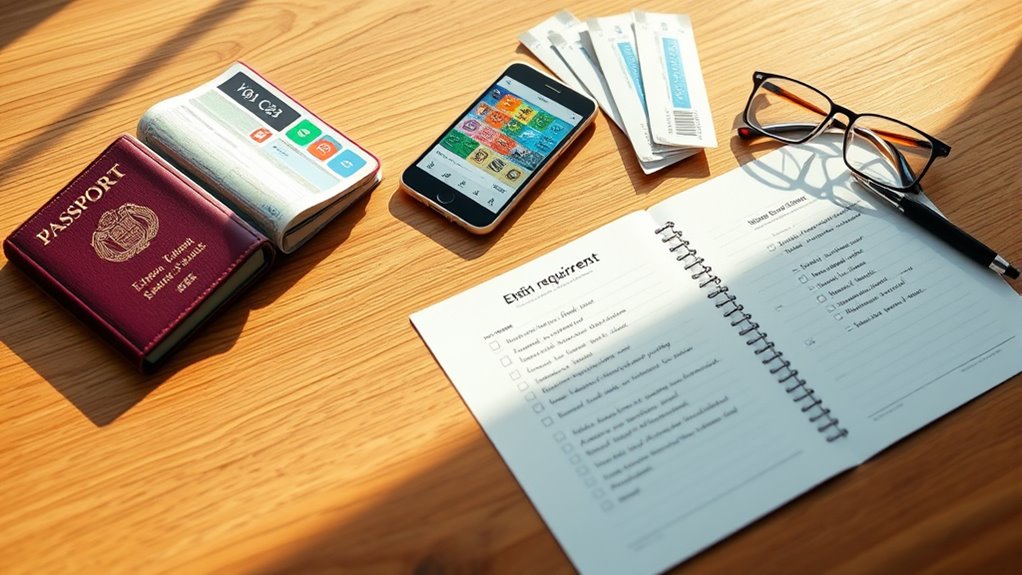
Have you checked the entry requirements and local regulations for your destination? Making sure everyone in your family has the proper documents and understands local customs is crucial. Verify visa needs, vaccination requirements, and whether travel insurance is recommended. Some countries have strict customs rules, so researching prohibited items helps avoid delays. To clarify, here’s a quick overview:
| Requirement | Details |
|---|---|
| Travel Insurance | Confirm coverage for all family members |
| Visa & Passport Validity | Ensure passports are valid for at least six months |
| Local Customs & Regulations | Learn about customs restrictions and etiquette |
Checking these details saves you surprises and ensures smooth entry. Preparing in advance makes your trip more enjoyable and stress-free. Additionally, reviewing entry restrictions can help you stay informed about recent travel advisories and health protocols.
Frequently Asked Questions
How Early Should I Start Organizing Travel Documents Before a Family Trip?
You should start organizing your travel documents at least 4-6 weeks before your trip. This gives you enough time to create a thorough travel document checklist, gather passports, visas, and other essentials. Incorporate your packing timeline early on by reviewing what’s needed for each family member. Starting early helps prevent last-minute stress, guarantees everything’s in order, and allows you to address any issues or renewals well ahead of your departure date.
What Are the Best Digital Tools for Managing Travel Documents Securely?
Like a trusty sidekick in a sci-fi flick, digital tools can safeguard your travel documents. You should consider apps that prioritize digital security and use cloud storage, so your files stay accessible yet protected. Tools like Google Drive or Dropbox offer encryption and password protection, ensuring your documents stay safe from cyber villains. These solutions streamline access, reduce clutter, and keep your family’s info secure during your adventure.
How Can I Ensure All Family Members’ Documents Are Up-To-Date?
To make certain all your family members’ documents are up-to-date, regularly check expiration dates for passports and plan renewal well before travel. Keep vaccination records current by consulting your healthcare provider and updating records as needed. Use a shared digital folder or app to track renewal dates and vaccination updates, so everyone stays prepared. Staying proactive helps avoid last-minute surprises and ensures a smooth trip for your family.
What Should I Do if a Family Member’s Document Gets Lost During Travel?
If a family member’s document gets lost during travel, don’t panic. First, stay calm and locate emergency contacts for the individual. Then, follow the replacement procedures outlined by your destination’s embassy or consulate. Having digital copies ready can speed things up. Remember, staying prepared with emergency contacts and knowing how to navigate replacement procedures helps you handle the situation smoothly, ensuring your trip stays on track.
Are There Specific Documents Needed for Traveling With Children or Elderly Family Members?
When traveling with children or elderly family members, you need to prepare specific documents like birth certificates, medical documentation, and any specialized visas required. Make sure to carry copies of these documents and originals in case of emergencies. It’s also wise to have a list of medications and doctors’ contacts. This guarantees smooth travel, helps with emergencies, and complies with travel regulations for vulnerable travelers.
Conclusion
By staying organized, you guarantee a smooth family trip. Imagine forgetting your child’s passport at the airport—disaster! But with a well-prepared folder and digital backups, you’ll avoid chaos. Double-check your documents, renew expired visas, and keep emergency contacts handy. When everything’s in place, you can relax and enjoy your adventure, knowing you’re ready for any unexpected twist. A little prep goes a long way toward making travel memorable for all the right reasons.
